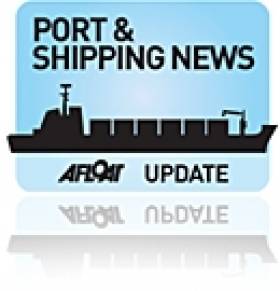Displaying items by tag: Energy Hub
EU CEF Funding for Rosslare Europort Secured towards Developing Ireland's National Offshore Renewable Energy (ORE) Hub
In the south-east Rosslare Europort has been named today as a direct port recipient in Ireland of securing EU Connecting Europe Facility (CEF) funding in the latest CEF call down.
In what is a major boost and vote of confidence by the EU in the Rosslare Europort Offshore Renewable Energy (ORE) project, the €2.5 million funding secured will support the project’s full design and planning application processes.
Rosslare Europort is Ireland’s best geographically located port to provide the required infrastructure to meet the requirements of the planned Offshore Wind Farms in the Irish and Celtic Seas and ensure that Ireland can deliver on its 2030 renewable energy targets.
The ORE facility at the port, which will be the first of its kind in the State, will include the construction of two new additional berths of between 240 metres and 330 metres in length, 20+ hectares of ORE quay side space, and a dredging program to create a nine metre access channel with berth pocket depths of up to twelve metres.
Glenn Carr Director of Commercial Business Units for Iarnród Éireann - Port Authority for Rosslare Europort - said “We are delighted to be the port in Ireland that was successful in what was a heavily oversubscribed competition for EU grant funding across Europe. It is testament to our ambitious plans that we have been successful in this call down and we now push forward in collaboration with all stakeholders to delivers Irelands first ORE facility and hub.
It is essential that the Rosslare Europort Offshore Wind facility be built and operational to meet the windfarm developments that are planned and support Ireland to deliver on its 2030 targets. We are committed to delivering this project which will be transformational for the Southeast and create many social and economic benefits for the county, region and country for decades to come.”
Feedback from the EU Commission on the Rosslare Europort ORE project included “will positively impact the competitiveness of the port towards the ORE industry and will result to socio-economic benefits including emissions reduction, multiplier effect, employment or development of the South East Region..... CEF funding will accelerate the project implementation, improve the quality of project implementation and will contribute to positive stakeholder support confirming EU support of the ORE industry.”
Investment Plan Rosslare ORE HUB
The Offshore Renewable Energy (ORE) Hub development at Rosslare Europort will be the first of its kind in a port within the Republic of Ireland. Representing a €220M investment, this world class facility will provide the ORE industry with the necessary port infrastructure to support the many Wind Farm projects planned for the Irish and Celtic Seas.
Additional Investment Plans at the port comprise Port, OPW and road infrastructure developments including:
- Rosslare Europort Masterplan, including port digitalisation: These works will reflect its status as Ireland’s Gateway to Europe and will include new freight and passenger facilities, storage, export and import facilities, berth extension. Matching the port’s physical transformation, a digitalisation of systems and operations is also planned which will deliver a better, more effective and more efficient Port
- Office of Public Works Project T7, to develop a permanent Border Control Post within the port, to provide the facilities and systems for all aspects of Border Control
- New TII N25 Rosslare Europort Access Road will ensure a better experience for port users and enhance quality of life for those living and working in the area by taking trucks out of the village and improving access and connectivity to the port.
In total, these developments will see a total of €350 million invested in the port and its environs.
Major Wind-Energy Hub Planned for Belfast Port
Belfast Harbour could potentially become one of the leading energy renewable hubs in the UK, when DONG Energy, a leading Danish energy firm, signed a letter of intent yesterday for an agreement to progress on a number of offshore wind farm projects in the Irish Sea.
In addition as part of the project, Belfast Harbour are to invest £40m in the development of a new 450-m long quay. The facility will be adjoined by a 50-acre logistics space on the southern shoreline of the port's docklands estate on Belfast Lough. The construction phase will create 150 jobs and up to 300 full time positions when the facility is completed, where the wind turbines and their foundations will be pre-assembled.
At that stage the large wind farm components will then be loaded onto specialist wind farm installation /construction vessels as depicted on the image by clicking here and to read further information on the overall project.
Attending the announcement which was held in Belfast Harbour Office, were representatives from the Northern Ireland Executive, Peter Gedbjerg, Vice President and UK Country Manager of DONG Energy, and Len O'Hagan, Chairman of Belfast Harbour. The energy hub scheme represents one of the harbour's largest ever capital investment projects.
























































